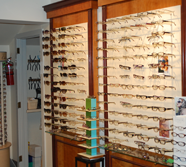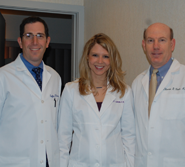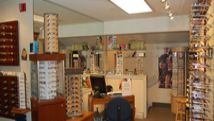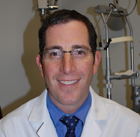There is no cure for glaucoma, but it is possible to halt the progression of the disease through surgery and/or medication. Glaucoma is a chronic condition that needs to be regularly monitored.
Glaucoma can be difficult to diagnose because there may be no initial symptoms even as eye pressure is building and affecting the optic nerve. If you notice a loss of peripheral vision that could indicate the beginnings of glaucoma – though a number of eye diseases share that symptom.
One of the best things you can do for eye health is to protect your eyes. Whether you are working in the yard, building something in the workshop or using tools for DIY home repairs, be sure to play it safe and wear eye protection.
Glaucoma refers to a group of diseases, characterized by damage to the optic nerves. The disease is progressive, and once it is diagnosed, treatment is ongoing. The tonometer, the device used to measure intra-ocular pressure, is one of the diagnostic tools available.
Did you know that the external muscles that move the eyes are the strongest muscles in the body for the job they perform? In fact, they are 100 times more powerful than they need to be.
We realize that you can’t trust everything you read online about how to protect your eyesight. Let’s talk about any specific concerns you may have during your next visit so that you can get your eye health tips directly from the expert.
Have you heard it said that seeing floaters in your visual field is a sign of retinal detachment? While this can be the case, it isn’t always. If you notice an increase in floaters, schedule an eye appointment when possible.
Some very famous doctors have been ophthalmologists. For example, Dr. Charles Mayo, one of the founders of the world famous Mayo Clinic in Rochester, New York was an ophthalmologist. It was here that the concept of medical specialization developed.
While many cataract patients opt for a standard lens implant that will only help them get rid of their glasses for distance vision, this isn’t your only option. Let’s talk about whether multi-focal lens options are appropriate for you.
Taking common-sense safety precautions can prevent more than 90 percent of eye injuries. A couple tips: Wear safety glasses when mowing the lawn or using power tools. Chill champagne to 45 degrees Fahrenheit and point the bottle away from you before popping the cork.
Cataracts occurs when the lens of the eye becomes cloudy, causing images to become blurred and colors to appear faded or washed out. Most cataracts are caused by a clumping of proteins in the lens.
While growing old is the single most common cause for cataracts, there are a few other risk factors, according to experts. People who are obese, smoke or have a history of cataracts in their family run a higher risk of developing the disease.
If you wear make-up, place contact lenses in your eyes first before you apply eye make-up. Avoid sharing eye make-up and periodically check expiration dates on mascara, eye-shadow and eye-liner to ensure that you are not using expired products.
Eye fatigue is something that most of us experience. It can be a result of working in front of the computer screen for too many hours or a lack of sleep. Allergies can exacerbate eye fatigue as well. Remember, when you experience eye fatigue, to rest your eyes; it will pay dividends in the long run.
When you’re on the computer, about how far away do you sit from the screen? Ideally, to avoid eye strain you should sit about 25 inches from the screen and position it so you are gazing downward at the screen instead of upward.
Basal Cell Carcinoma is a malignant tumor of the eyelid. It is one of the most common conditions of the eye and must be treated early in its developmental stage. A biopsy will determine the severity of the growth and determine the next step in treatment.
Although glaucoma is a serious eye disease people typically associate with the elderly, anyone can develop it. In fact, one in 200 people age 50 and younger are diagnosed with glaucoma each year.
It is important to regularly visit the ophthalmologist and to have your eyes dilated and checked for diseases such as retinitis pigmentosa. RP is actually an umbrella term for a number of diseases that attack the retina in the back of the eye.
We will be opening late today at 10:30 am. If you had an appt we have called and left you a message. Stay safe!
Ophthalmic Associates of Fort Washington will be closed on Monday 2/1. We do have physician’s on call for emergencies with our answering service. Stay safe
Do you have poor night vision? Is your vision cloudy or blurred? Do you see a halo effect around lights? All of these symptoms can be due to the formation of cataracts. Setting up a consultation is the first step on the road to clear vision.
We are excited to announce that we now offer Myopia Control options in our office.











